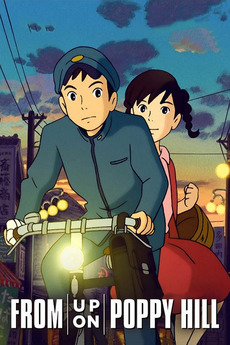From Up On Poppy Hill

I pray for safe voyages.
Going into From Up on Poppy Hill, my main context was that of mostly understanding it as nobody's favorite Studio Ghibli—not to say that it's bad so much as it is unremarkable in a literal sense.
And, in fairness, there's a certain flatness to its texture, containing neither the weighty undercurrent sported by Princess Mononoke, Spirited Away, or The Wind Rises, nor the childlike fantasy of Kiki's Delivery Service or My Neighbor Totoro. The reason for that is fairly simple: this movie is more of a vibe than a plot, and I truly do not mean that as a critique.
(The one thing that you could say "happens" in this film is that two very charming people meet and discover that they are not related by blood. But I can't grade Studio Ghibli films by the same rubric that I might grade other things.)
I think what Miyazaki accomplishes and tries to accomplish is a different thing than most other directors, and I think the fun and joy of watching his work is getting to let it all wash over you.
There is something so deeply warm and pure-hearted about the naivete and chaos of this tiny little world we spend 90 minutes in modernity, enemy as it is in so much of his work, minimized even further as a villain to the very margins we spend our time not thinking about the trials of the Latin Quarter and the sea-side boarding house, and perhaps by extension how far away today we are from such idylls.
Movies do so many things; great movies even more so. I remember the first time I watched My Neighbor Totoro — five years ago, with my then-partner and now-wife, and suddenly understanding at the beginning of the final act just what the movie was actually about, and becoming absolutely overwhelmed with the terror and panic unique to being a very young person who does not know many things about the world but knows that the person they love is having something bad happen to them, and wanting to do anything you can to help. That Totoro can do that is not a magic trick; it is a portal, and a portal I step in even by writing and thinking about it.
And where Totoro's success is by placing you in the heart and eyes of its protagonists, Poppy Hill is more interested in the distance between the two stories it tells: the tragedy of the parents, the joy of the kids. And that can be a kind of amulet: a daughter to a martyred father and distant mother, facing a world rife with change and upheaval, who spends each day grateful to raise a set of signal flags — whose hardest evening is one with a last-minute trip to the market at the bottom of the hill. Life was hard then, and yet luck and bliss in every corner — life is hard now, and yet blessing upon blessing for all those willing to listen.
